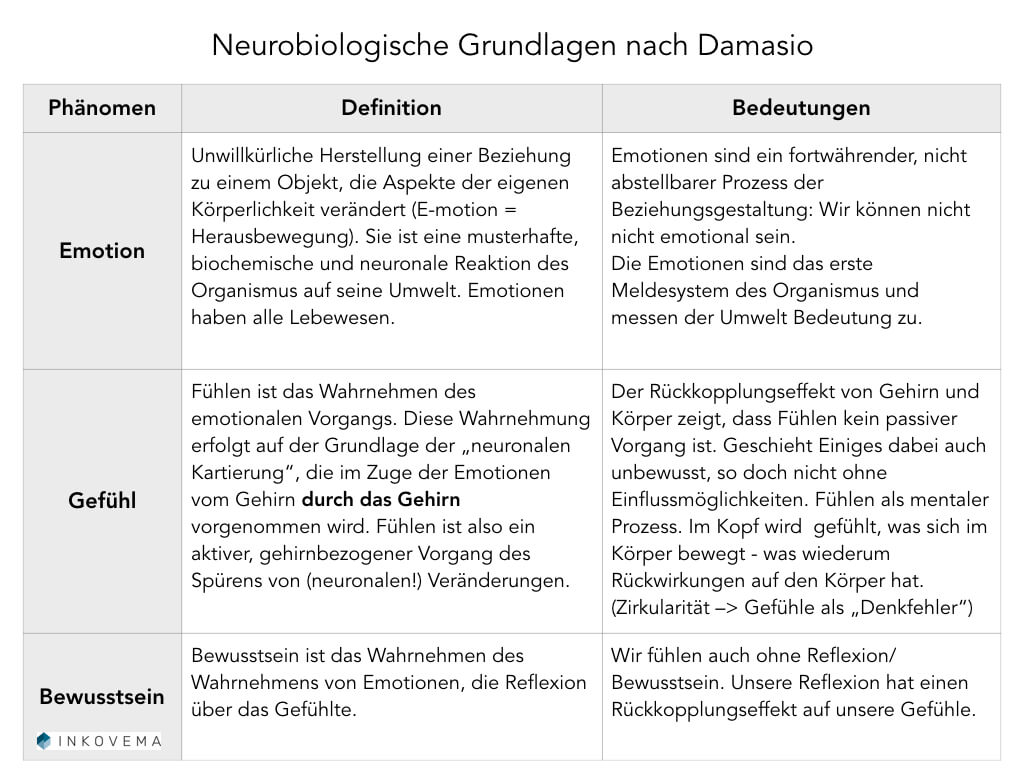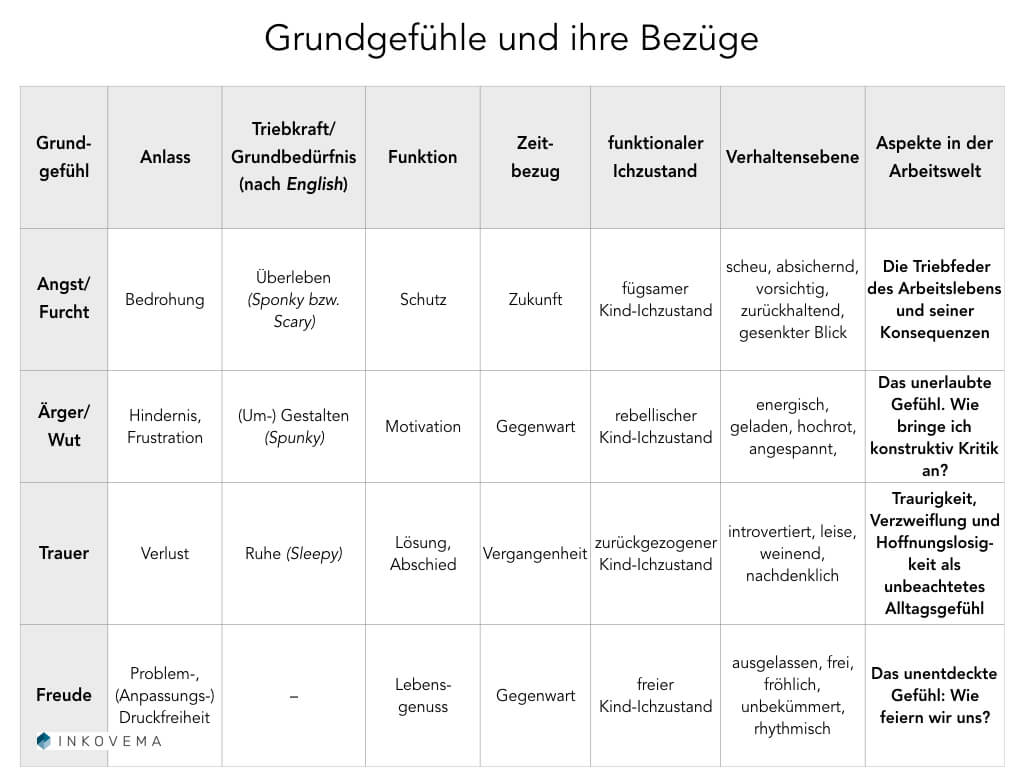Why it simply doesn't work without feeling!
Feelings and emotions in mediation
25 Basics of mediation (18)
Much of what people think are feelings are errors in thinking. (B. Schmidt)
The biggest myths surround the topic of „feelings in mediation“. Of course, this also has to do with the fact that when it comes to „feelings“, the discussion is generally often characterised by errors in reasoning. There are not many topics where the chain of reasoning coils around itself like a self-reflexive snake and… bites. But unfeeling as it is, it doesn’t realise it!
One thing is certain: it doesn’t work without emotion. Neither the conflict nor its successful resolution, regardless of the level, takes place beyond the world of emotions. On the contrary, every fight, every war, even sporting disputes make use of emotions and feelings, fuelling them, letting them boil over and thus releasing physical energy. But emotions and feelings are also needed at the level of delegation, mediation and even more so in negotiations.
Without feelings, we could never make a decision – the rationalists forget that.
Without feelings we could never make a decision! Rationalists forget this. Their mistake is to believe that decisions should be free of emotions and feelings in order to be particularly good or right. The fact is, however, that without feelings and emotions, no decision would be possible at all because we would have no sense of what is right and wrong. But this now needs to be explained. Because without a mental frame of reference, which can
- Perceptions
- Emotions
- Feelings
- Feelings of thought
- Substitute feelings
should include, it is not possible. That is why the 18. contribution of the basics of mediation this subject area, which will always be topical in mediation.
1. neurobiological principles according to Damasio
In order to conceptualise emotions and feelings in a meaningful way, it is worth drawing on a few neurobiological principles. I base this primarily on the work of Antonio R. Damasio, who wrote a series of books on the subject not so long ago: Descartes‘ Error (1994); I feel, therefore I am (1999); The Spinoza Effect (2204).

2. general functions of emotions and feelings
Emotions are Functional control processes of our lives and the organism's first "signalling system" for changes in the environment.
- You practise a Regulatory function which is originally important for further survival. The body serves as a stage for emotions. However, unlike actors who can change their stage, emotions remain closely connected to our body. The brain perceives the staging of emotions and reacts to them. The experience of emotions then leads to a reflexive effect on the body. The brain activity of feeling enables perception, which in turn forms the basis for attention. Emotions direct our attention to problems that have already begun to emerge and motivate the organism to adapt to the changing environment. Emotions show how people relate to their environment and thus form the Basis for our specific thinking, planning and decision-making. This function cannot be switched off; our decisions are always based on emotions.
- Emotions, the perception of emotions and the realisation of these processes represent a functional continuum and justify a Valuation chain of the Organism "People"that is needs- and interest-orientated. This is important for conflict and negotiation management.
- From the perspective of the environment, emotions and feelings can be characterised as The organism's means of contact and communication which also - mediated by the production of oxytocin and endogenous opioids etc. - cause bonding behaviour. Still worth reading Joachim Bauer: The memory of the body (2202); Why I feel what you feel (2205); Principle of humanity (2006). Although the Importance of mirror neurons now relativised becomes or even has to become(?), cf. Gregory Hickok, Why we understand what others feel (2015).
3. basic feelings, social and complex feelings
Social feelings are the result of an original learning process that takes place in dialogue with others and through (re)thinking, i.e. reflection. These include feelings of shame and guilt, but also trust and serenity. Complex feelings are the results of reflection processes and therefore evidence of individual awareness and development processes. Fundamentally, however - especially for the work in mediation - four Basic feelings which are particularly relevant in conflicts and conflict resolution.

4 The four basic feelings
Especially in the context of transactional analysis four basic feelings on which the social or complex feelings briefly mentioned above are based.
The four basic feelings are
- Fear,
- Trouble,
- Mourning and
- Joy.
While fear serves to mobilise strength and energy to avoid danger, anger serves functionally to clear obstacles out of the way. Grief, for its part, enables us to let go of what we have come to love and to "process" losses. The common function of these feelings is to overcome the problem of adapting to the changed environment.
Joy, for its part, arises as a feeling when there is freedom from problems, in the rare moments when there is no pressure to adapt to the environment. Therefore, moments of being able to let go or be detached are the goal of any meditation, although the idea of such a goal could actually prevent joy through the pressure to conform. Everyone who embarks on this WAY OF NOT GOING experiences this paradox.
In this way, the basic feelings can be related not only to the occasion situations, but also to their temporal references and modes of functioning.

5. feelings of thinking
As already indicated, feelings are also feelings of thought, i.e. they are shaped, developed and formulated through thoughts and judgements. This results from the chain of situation perception – (evaluation – feeling) – behaviour (Mohr). The evaluation processes are often not clear or conscious. It is therefore important that identification with a feeling is scrutinised and examined in the same way as identification with a thought.
The deceleration in conflict resolution initiated in mediation is primarily aimed at the influence of thoughts on feelings and vice versa. If you move too fast, you get confused.
Because feelings Personal territory special caution is required here in mediations. While thoughts are regarded as components of systems of ideas and conclusions that can be debated and on which one can also have a negative opinion, this is by no means the case for feelings in everyday life. Feelings are regarded as irrevocable, honest and immovable. They are to be accepted and are always and everywhere true. Those who argue with their own feelings may sometimes be wrong, but they are always right.
Precisely because feelings and thoughts are so closely interwoven and influence each other, it is It is necessary to slow down conflict managementso that the effects can also materialise. In order to be able to resolve sensitive problems and heated conflicts, it is generally necessary to inner observer and let it work, because it is he who transports the effects between thoughts and feelings. He is like the key master that you let do the work so that reassurance, clarity and serenity can be achieved. enter can.

6. substitute feelings
Substitute feelings are an original concept of transactional analysis (TA).
Substitute feelings are specific to TA.
However, the concept is particularly helpful for work in mediation and mediating conflict management in other contexts. I can only recommend that all managers familiarise themselves with this concept and review their leadership work accordingly.
What substitute feelings are
The TA speaks of a substitute feeling when a Feeling perceived and/or expressed instead of anotherbecause this replacement process is (unconsciously) experienced as socially desirable or the initial feeling is experienced as undesirable. Transactional analysis therefore distinguishes between authentic feelings and substitute feelings. Authentic are feelings that are appropriate to the situation and to a certain extent spontaneous reactions. Situationally appropriate feelings are those that arise in response to current events and serve the original function of feelings.
Substitute feelings are to the world of emotions what prejudices are to the world of ideas – true blockers and obstructors.
Substitute feelings are old attempts to solve problem situations from the past that are no longer relevant today. They are the stereotypical attempts at solutions, the dysfunctional but familiar and „tried and tested“ emotional reactions of today. They cause the very discomfort that is blamed on others in the conflict. In a way, they are the Prejudices of the emotional worlds.
Functional emotional experience, on the other hand, does not cause permanent discomfort, but has a liberating and relieving effect despite all the pain. The constant replacement of a functional and authentic feeling with a substitute feeling proceeds unconsciouslywhich is why the substitute feeling is experienced as "real" by the person themselves. This is precisely where actual conflict resolution also brings about personal development and this is where mediation has a transformative effect. The concept of substitute feelings shows most clearly why TA-based mediation has become the style of transformative mediation must be counted.
How substitute feelings arise
Substitute feelings are an expression of a past social learning process. Our emotional life is far more socially and culturally conditioned than we often assume. We learn at an early age which feelings are favoured, desired or even allowed in our social environment, especially by our caregivers, and which are rejected and forbidden or actually become so. We learn which feelings (are allowed to) exist and how we should deal with these feelings. In contact with others, we create our personal emotional filter. For some, certain feelings are not allowed to be felt, while for others these feelings are simply not allowed to be expressed. Or certain feelings may not be expressed with certain behaviours, but may be expressed with others.
Mechanisms of learning are on the one hand Prohibitions and bans ("Don't cry!"), on the other hand also Attributions ("You're tired!" instead of angry, for example), but also the Model learning so that children take on the substitute feelings of the caregivers „.
This makes it understandable that "big city cowboys" neither cry nor know pain, because they learnt early on that "Indians" don't know pain either and wouldn't show it at all. On the other hand, they are allowed to be confused and withdrawn or cause a lot of trouble. On the other hand, "little princesses", who are supposed to be sweet (for princes), are not allowed to get angry or annoyed: Sadness or a depressive mood, however, is conceded to them. In general, however, it can probably be said that such stereotypes are increasingly dissolving and are becoming more and more common with the neosexual revolution over the last twenty years.
What function and mode of action substitute feelings have
Substitute feelings have the origin of Protection of the person to meaning. In a situation of dependency and being at the mercy of others, substitute feelings are sensible adaptations that ensure social survival and integration. In adult life, however, the much sought-after here and now, the protective mechanism is active out of habit (and rationalised conviction), but unnecessarily, inappropriately and often excessively. Its mode of action then corresponds more to a "self-imposed prison".
For others, substitute feelings sometimes seem like Attempts at manipulation, even with a blackmailing touch. This so-called. Racket behaviour is then an expression of one's own passivity, which should (unconsciously) prompt others to act.
With the "offended liverwurst", it quickly becomes clear how powerful the retreat is with sobs and slamming doors, how reproachful and confused those left behind endeavour to become active again, but at the same time more cautious. In general, the exaggerated grand emotional gestures ("I can't stand this any longer", "I've always wanted to tell you what I think…!" etc.) are more an indication of racket behaviour, in which the substitute feelings are first collected and then paid out all at once (redeeming the stuffed discount stamp booklet).
Since we (mistakenly) assume that others (can) make us feel, we also blame them (e.g. "You make me angry!"; "You must despair."). In mediation, for example, the concept of substitute feelings draws attention to the fact that the participants themselves are responsible for their feelings and their emotional experience, despite all social and cultural contextualisation. And it represents one of the The most important task in mediation is to moderate these emotional worlds – because they are also in a communication relationship in which the entire „history of origin“ is also present. This makes this one of the most complex fields of work for mediators – and also one of the most exciting.
How to recognise substitute feelings
Have substitute feelings atmospherically the "wrong tone" and a "bland flavour". Their tendency towards repetition makes us sit up and take notice. Substitute feelings appear artificial and lead to the vague impression of being exploited.
The following questions are helpful and can assist you in tracking:
- Do I or others feel uncomfortable about the other's expression of feelings? Do I feel exploited?
- Is there a plausible, functional connection between the reason and the feeling expressed? Can the germ of a constructive solution be derived from the emotional expression? (You can react angrily to loss at times, but sadness and pain are functionally appropriate. The anger should therefore subside in the short term, otherwise it smacks of a substitute feeling).
- Does the feeling or behavioural expression have a tendency to repeat itself?
- If the emotional expression and behaviour smells of a position of the Drama triangle?

How to deal constructively with substitute feelings
It is also worth contributing to constructive communication at an emotional level. Firstly, this includes not encouraging rackets and, if in doubt, refraining from any further intervention. This is because substitute feelings are a highly complex and sensitive issue. Their substitute character is not felt or consciously recognised. Even appreciative confrontations are quickly experienced as heartless, hurtful and arrogant.
Nobody gives up their spare feelings just like that. After all, that would be a drastic loss. That is why (alternatively) reacts with anger.
Highest guideline for the social Dealing with substitute feelings is self-observation and self-clarification. Where do we ourselves have difficulties with certain feelings whose expression is subject to clouding?
- Compared to substitute feelings Respect and recognition (even when ignored!) is the safest reaction. Do not allow yourself to be put off. Respect for the „(different)-ness“ of others is an unconditional prerequisite for constructive progress.
- Little attention paid to the specific racket behaviour, full Allowance towards the person!
- Not without clear contradictions Relationship contract ("Under what conditions is it okay for you that I address this topic?"; "May I draw your attention to contradictions in the context of this mediation?").
- Contradictions cautious but clear address ("I saw you sad earlier after you had a short temper. If I were you, I would be angry. What's with your sadness?")

About the feelings: I will install the inner observer. (until now I was always the silent observer from the outside). Thank you for that!
Thank you very much, Kerstin, that sounds promising and is a good start. Good luck and good luck with it!
Thank you!
And I'm also going to work on the replacement feelings.
...it's best to "uncover" things first with an archaeologist's brush and take a close look at them. This is a good and appreciative preliminary work for changes, which will pay off later in terms of time and effort. I'm glad you're inspired by the posts, Kerstin.
Oh yes, they do! I'll continue "sifting" through them at my leisure tomorrow at the latest.
Reads completely differently after six months. ☺ "The four basic feelings and their references" is also very helpful. Thank you! ☺
„I saw you sad earlier after you had a short temper. If I were you, I would be angry. What is it about your sadness?" - you have to get that right in mediation! I imagine it's really difficult, but we'll certainly practise it.
The function and mode of action is already well described with the insulted liver sausage. The view that people think others are responsible for their own feelings is also so often true that it should actually be suggested to everyone…. It would certainly save many a marriage and prevent divorces.